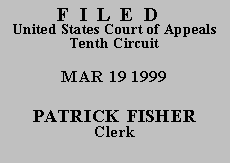

| HARLIN DONNELL THIERRY, | |
| Petitioner-Appellant, | |
| v. | |
| RON WARD and ATTORNEY GENERAL OF THE STATE OF OKLAHOMA, | |
| Respondents-Appellees. |
Proceeding pro se, Petitioner Harlin Donnell Thierry appeals the district court's dismissal of his 28 U.S.C. § 2254 petition for writ of habeas corpus. He asks this court to issue him a certificate of appealability and renews his motion to proceed in forma pauperis on appeal.
Petitioner is serving consecutive sentences for his convictions in Oklahoma state court for two counts of Running a Roadblock After Former Conviction of Two or More Felonies. Petitioner exhausted his state court remedies by directly appealing his convictions and sentences and by filing applications for post-conviction relief. In his habeas corpus petition, Petitioner claimed that his Fifth and Fourteenth Amendment rights were violated in three ways: (1) evidence of pending escape charges and other criminal charges was erroneously admitted; (2) the evidence was not sufficient to convict him of running a roadblock because it did not establish that officers erected a roadblock as defined by Oklahoma law; and (3) the trial court failed to instruct that the crime of eluding was a lesser included offense. Petitioner also alleged that the two convictions and consecutive punishments violated his Fifth Amendment right against double jeopardy because the conduct leading to the charges constituted a unitary criminal episode. The district court dismissed the petition on its merits after determining that Petitioner failed to present an argument supporting federal habeas relief because the state court adjudication of his first three claims was consistent with federal law. The court also determined that Petitioner's two convictions did not violate the prohibition against double jeopardy. See R., Doc. 13 at 4-5.
On appeal, Petitioner argues that the district court failed to conduct a proper review of his habeas corpus petition. He contends that all of the issues raised in his petition are debatable among jurists and meet the standard for issuance of a certificate of appealability. He claims that he was deprived of his liberty without a fair trial and due process of the law, and he asks this court to decide the merits of his claims in light of the principle of liberal construction of pro se pleadings set forth in Haines v. Kerner, 404 U.S. 519, 520 (1972).
While we construe Petitioner's appellate filings liberally, see United States v. Hardwell, 88 F.3d 897, 897 (10th Cir. 1996), his pro se status "does not excuse [his] obligation . . . to comply with the fundamental requirements of" 28 U.S.C. § 2253 to appeal the denial of a habeas corpus petition. Ogden v. San Juan County, 32 F.3d 452, 455 (10th Cir. 1994), cert. denied, 513 U.S. 1090 (1995). After thoroughly reviewing Petitioner's application for a certificate of appealability, his brief, and the record, we conclude that he has not substantially shown the denial of a constitutional right. See 28 U.S.C. § 2253(c)(2). Accordingly, for substantially the same reasons stated in the district court's Order dismissing the petition, we DENY Petitioner's request to proceed in forma pauperis on appeal, we DENY his application for a certificate
of appealability, and we DISMISS the appeal.
Entered for the Court
Monroe G. McKay
Circuit Judge
*. This order and judgment is not binding precedent, except under the doctrines of law of the case, res judicata, and collateral estoppel. The court generally disfavors the citation of orders and judgments; nevertheless, an order and judgment may be cited under the terms and conditions of 10th Cir. R. 36.3.